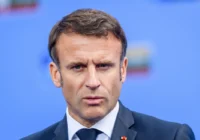Two conflicting narratives have been clashing anew in extremely heated debates amid what we may call “a new cartoon crisis.” On one side, there is a sizable portion of orthodox Muslims with a strong aniconism tradition and who perceive the representation of sacred characters as unpardonable blasphemy. On the other are defenders of secularism who consider freedom of expression a holy human right. The world is witnessing the confrontation of two epistemologically divergent civilizations: a humanist one that killed God and put the human at its center, and a metaphysical one ready to die and kill for its deity and sacrosanct icons.
Is Peace Religious or Secular?
“Islam is a religion that is in crisis,” stated French President Emmanuel Macron, as he unveiled his plan to defend French secularism against Islamic extremism in early October. This prompted a backlash from Muslim communities around the world. The events escalated further amidst the beheading of a French teacher who shared with his class derogatory caricatures featuring Prophet Muhammad. In an act of defiance, Macron insisted the French will make no concessions and would “not cease drawing caricatures” as Paris displayed gigantic reproductions of the cartoons in question on government buildings.
Post-Truth Era
The current situation is a classic case of a post-truth-era dilemma. Each camp firmly believes it is the keeper of a universal, irrefutable truth, while in reality it lives inside its own ideological bubble and refuses to accept that there are other truths out there and probably a transcendental one that is beyond all opposing paradigms.
Post-truth — which was named the Word of the Year in 2016 by the Oxford Dictionary in the midst of the divisions caused by Brexit and the election of Donald Trump — is a philosophical concept that signals a context where shared rational facts are replaced by subjective and emotional beliefs that shape public opinion. French humanism is rooted in centuries of reforms ending in a rupture between the state and the church. Muslim societies lived a completely different historical reality, where metaphysics are central and populations still romanticize the theological concept of the umma (global Muslim community).
In an ideal world, both “truths” would be able to coexist peacefully. Nevertheless, France never overcame its colonial mindset with its good old “civilizing mission.” Macron arrogantly insinuates that it is the white man’s burden to modernize and secularize a Muslim world “in crisis.” Acts of terror committed by Muslims are indubitably repugnant and humanly unacceptable, but so is radical secularization and the extremist modernization dogma that blindly attempts to assimilate citizens into the fifth republic’s grinding machine.
Defenders of the French perspective would say: Why don’t followers of other religions get angry when we draw Jesus or Moses? This is a shallow and simplistic comparison that does not take into consideration the cultural and anthropological particularity of the Muslim community, nor the sanguinary colonial encounter it had with France just decades back in Africa. It also characterizes the obstinate myopia with which the country of Marianne continues to deal with its almost 6 million Muslims.
Maybe the most revealing inconsistency in the French discourse can be summed up in a saying repeated by those who call to boycott French products: “Insulting a black person is racism, insulting a Jew is anti-Semitism, insulting a woman is sexism, but insulting a Muslim is freedom of expression.”
Both Sides Demonize the Other
Of course, not all French people are rigid defenders of the values of the republic. Many philosophers, artists and journalists came out to condemn the French president’s provocations. However, as in many post-truth dichotomies, both antagonists compete to demonize the other, which fuels further hate and animosity. Moreover, instead of fighting violent extremism, it can do just the opposite, such as with the previous Danish cartoon controversy of 2005 and the Charlie Hebdo attacks in 2015. Meanwhile, Muslims are flooding the internet with hashtags and memes against Macron, while countries like Kuwait removed French products from its shelves and the Turkish president even questioned the mental health of his counterpart in Paris.
To answer Macron’s statement, we can regrettably say that France is a country in crisis because of its failure to address systemic racism against Muslims and its refusal to embrace cultural plurality and hybridity. In the French context, Edward Said’s “clash of ignorance” can no longer be used as an excuse to hide the clash of truths between radical secularism and Muslims refusing to kill God for Marianne.
*[An earlier version of this article was published by Raseef22.]
The views expressed in this article are the author’s own and do not necessarily reflect Fair Observer’s editorial policy.
Support Fair Observer
We rely on your support for our independence, diversity and quality.
For more than 10 years, Fair Observer has been free, fair and independent. No billionaire owns us, no advertisers control us. We are a reader-supported nonprofit. Unlike many other publications, we keep our content free for readers regardless of where they live or whether they can afford to pay. We have no paywalls and no ads.
In the post-truth era of fake news, echo chambers and filter bubbles, we publish a plurality of perspectives from around the world. Anyone can publish with us, but everyone goes through a rigorous editorial process. So, you get fact-checked, well-reasoned content instead of noise.
We publish 2,500+ voices from 90+ countries. We also conduct education and training programs
on subjects ranging from digital media and journalism to writing and critical thinking. This
doesn’t come cheap. Servers, editors, trainers and web developers cost
money.
Please consider supporting us on a regular basis as a recurring donor or a
sustaining member.
Will you support FO’s journalism?
We rely on your support for our independence, diversity and quality.





